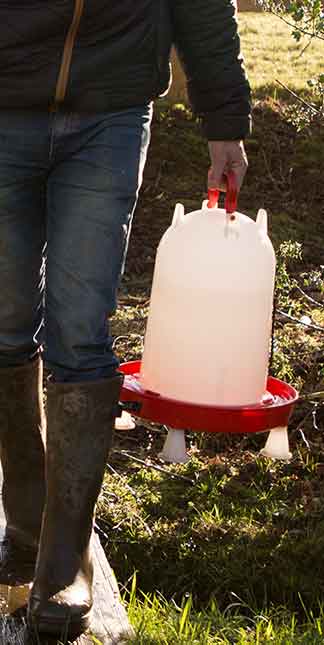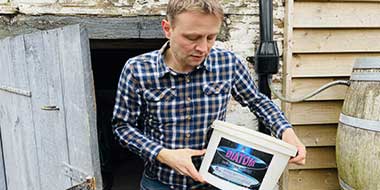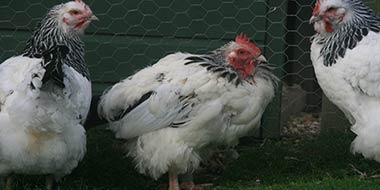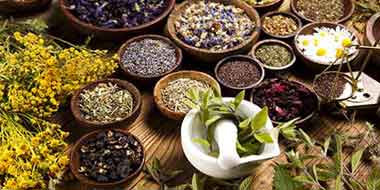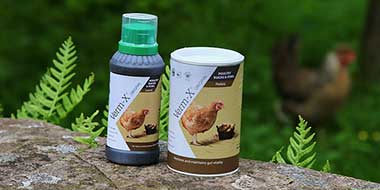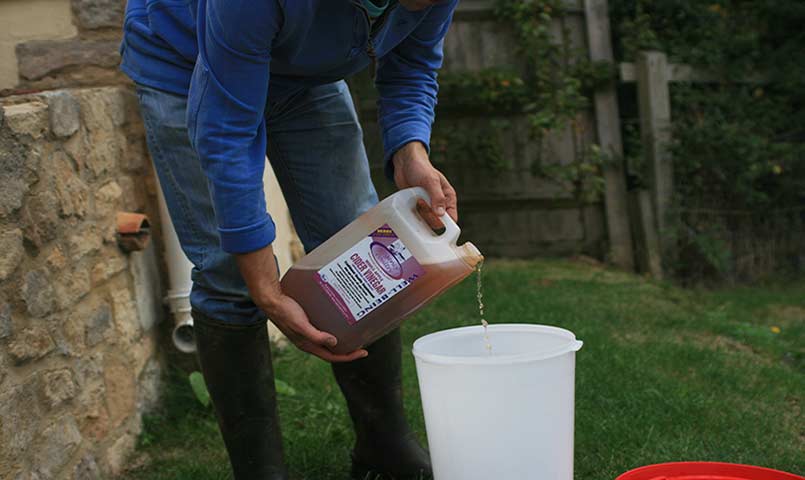
Keeping
Chickens
Healthy
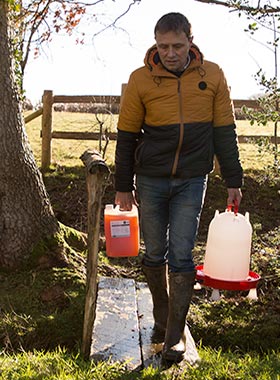
I have been giving Apple Cider Vinegar (ACV) to my chickens for many years, and can undoubtedly say that combined with good husbandry, have seen a positive difference in the health of my flock.
There are, however, many exaggerated claims (that have little evidence), and I don’t believe it’s a miracle cure.
Still, as with many natural approaches, over time, it can help your hens to stay healthy and there is now even some research emerging from the commercial poultry sector supporting this.
You have probably already heard about apple cider vinegar and its health benefits. There has been much good press in recent years, and every health food shop and supermarket now sells natural, unpasteurised apple cider vinegar.
What is apple cider vinegar?
Natural apple cider vinegar is slightly acidic with a ph of 5. It contains organic acetic acid (which gives it the “vinegar taste”). It contains trace elements, vitamins and minerals such as phosphorus, magnesium, potassium and calcium. Apple cider vinegar also contains probiotic bacteria called acetobacter and lactobacillus.
What are the benefits of apple cider vinegar for chickens?
With these nutrients, apple cider vinegar is an excellent general tonic for chickens. Still, also, when metabolised as part of a balanced diet, it helps to increase the acidity level/lower the pH level in the gut. Lowering pH levels raises resistance to infection, by making it a less friendly place for harmful bacteria, as well as oocysts (a coccidian parasite causing coccidiosis in chickens) and possible poultry worms which prefer a more alkaline environment to thrive.
As well as this, the potassium content helps to build cellular wall strength which also helps to enhance resistance to bacterial infection.
Some of the most credible claims of apple cider vinegar for chickens are:
- Reduces stress, which all poultry are prone to at various times.
- Increases resistance to infection.
- May help to prevent poultry worms.
- Help to prevent coccidiosis.
- Improve fertility during the breeding season.
- It improves digestion and weight gain in chicks and growers.
- Keeps water containers cleaner/algae free.
- More flavour to poultry meat.
As well as using apple cider vinegar for chicken’s health, it is useful for cleaning and disinfection. The acetic acid kills off bacterial cells by penetrating cell membranes of these microorganisms.
What evidence is there?
So here’s the “million-dollar question”.
As I said at the start, I don’t believe it is a miracle cure.
Some of the claims do seem to be quite miraculous, and it would be difficult for me to perform controlled tests to prove or disprove them, however, let me start by saying, I have kept chickens all of my life, spend a lot of time with them daily, so think I know them very well, and I have seen positive results when giving my chickens apple cider vinegar.
Here’s what I can say:
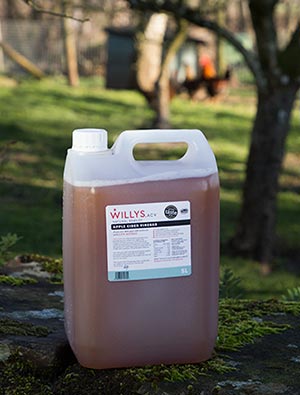
- I have NEVER seen coccidiosis in my chicks/growers (and yet it is quite a common problem). I have been hatching chicks for over twenty years.
- I used to worm my chickens regularly, but since worm count kits have been made available, I’ve tried using a combination of natural methods, including apple cider vinegar with good husbandry. I haven’t had a single positive worm count (in five years).
- I’ve had healthy birds but, notably, very few losses that I couldn’t explain. Their immune systems seem to be working well!
- My chicks and growers have thrived, growing well, and by point of lay, I have noticed the gloss and shine on their feathers.
Everything I can say about apple cider vinegar is subjective and non-scientific, so I have summarised a few studies I have found that may suggest there is, in fact, something in this.
When you start to look for research papers, there is quite a large number that looks at organic acids such as acetic acid found in apple cider vinegar.
Polish Journal of Veterinary Sciences 21(2):361-369 June 2018
F M F Hayajneh, M Jalal, H Zakaria, A Abdelqader, M Abuajamieh
What did they do?
They divided four hundred and fifty broiler chickens into three groups of 150 chickens:
- T+vc: Amprolium positive control group.
- T-vc: Negative control group.
- Tv: Apple cider vinegar group.
They were all fed a balanced diet. Amprolium (used to prevent and treat intestinal coccidiosis) was added to the feed of the positive control group T+vc.
Apple cider vinegar was added to the water of Tv group.
From three weeks of age, they took faecal oocyst counts of three random birds as well as blood samples.
The results
- Chickens in T+ve and T-ve groups showed clinical signs of coccidiosis (there was blood in the faeces) and the faecal oocyst count increased with time.
- Chickens in the Tv group (the chickens that had apple cider vinegar in their water), they observed no clinical signs of coccidiosis.
If you would like to read more about this research, it can be found here.
Journal of Applied and Natural Science 9 (4): 2152 -2157 (2017)
Zulfqarul Haq, Ankur Rastogi, R. K. Sharma and Nazim Khan
This article discusses the results of a large number of research papers and references over 100!
The results
From the literature they discuss, they show that adding an organic acid had beneficial effects on chickens.
- There are acid-intolerant species of bacteria like E. coli, Salmonella and Campylobacter that are affected by organic acids.
- Organic acids reduce microbial competition for nutrients and improve nutrient digestibility.
If you would like to read more about this research, it can be found here.
Veterinary Medicine and Science doi: 10.1002/vms3.408 Dec 16 2020.
Mohammad Jahantigh, Heydar Kalantari, Seyedeh Ayda Davari, Dariush Saadati.
What did they do?
They selected 64 healthy Ross broiler chicks and divided these into four groups:
- Group 1: The control group.
- Group 2: Given apple cider vinegar at 1% dilution.
- Group 3: Given apple cider vinegar at 2% dilution.
- Group 4: Given apple cider vinegar at 3% dilution.
They were fed a standard diet for 28 days.
The results
Over 28 days, their results showed that groups receiving apple cider vinegar had a higher body weight gain than the control group. There was also a significant increase in the level of antibodies against Newcastle disease.
If you would like to read more about this research, it can be found here.
International Journal of Poultry Science 7 (3) 2008.
S.A. Abdel-Fattal, M.H. El-Sanhoury, N.M. El-Mednay
What did they do?
They took 189 Hubbard broiler chicks and divided these into seven groups. All were fed the standard diet. Group 1 was the control group, and three groups received supplements of organic acids at 1.5% and three at 3% of their diet:
- acetic acid (found in apple cider vinegar)
- citric acid
- lactic acid
The results
Chicks that had the organic acids in their diet had a better immune response, and higher calcium and phosphorus concentrations were noted. There was a significant reduction in abdominal fat and serum level of cholesterol and total lipid. They had better live body weight gain and feed conversion ratio.
If you would like to read more about this research, it can be found here.
How is apple cider vinegar made?
Here in Herefordshire, we have a lot of old poultry orchards, and there are several producers of cider as well as apple cider vinegar. I have had quite an interest in making my apple cider vinegar from the old cider apples in our orchard on our smallholding.
These old trees provide shelter for my chickens from overhead predators as well as produce the apples I need for their cider vinegar. In return, my chickens eat bugs and add manure to the ground to benefit the trees, so I like to think of it as a virtuous circle.
We make apple cider vinegar for chickens, from apples, yeast and acetobacter bacteria in the form of “The Mother”. It is a two-step process: crushing and pressing the apples creates apple juice which is loaded with natural sugar. Shortly after adding yeast, it starts to ferment, to turn sugars into alcohol, and the result is apple cider.
The second stage is to add a bacteria called acetobacter in the form of a symbiotic culture of bacteria and yeast, which form a zoogleal mat called the “mother of vinegar”. This colony is similar to a SCOBY used to make kombucha, a fermented tea, or a sourdough starter used for making bread. The acetobacter consumes the alcohol and produces acetic acid, a key ingredient in vinegar that provides it with its familiar taste. The process stops itself when the bacteria run out of alcohol to consume (it sounds like a ‘bit of a party in there!).
The whole process usually takes about six weeks. The result is natural apple cider vinegar with the mother.
Natural apple cider vinegar with "The Mother"
During the secondary fermentation that takes place to produce acetic acid, there is a bacteria by-product which, as the liquid finishes fermentation and starts to clear, forms a thick residue on the bottom of the fermentation vessel.
This good bacteria residue is often called “The Mother” of vinegar. Commercially, many vinegar producers take the raw apple cider vinegar product and filter it to remove The Mother, to make a more appealing clear liquid. Some producers pasteurise their products, which also kills off any good bacteria.
Removing The Mother removes a lot of good bacteria and enzymes that offer potential health benefits.
When I first wrote about apple cider for chickens, I used to say look for natural or unpasteurised apple cider vinegar in health food shops or in equestrian shops (it has been a popular tonic for horses for many years). Still, these days, there are more and more cider vinegar products appearing in supermarkets that are natural and unpasteurised.
Quality
Are all brands of apple cider vinegar the same?
Whilst there are now several brands of apple cider vinegar for chickens on the market, not all of them are the same quality. Look for unpasteurised, with “The Mother” which contains most of the goodness from a medicinal point of view.
The concentration of acetic acid varies according to the production method, look for dark coloured vinegar, the same colour as an apple juice and a minimum acidity level of 5%. Find a product made from whole apples.
Don’t go for the cheapest brand, which is likely to have been made from apple pulp. It is a by-product of the cider-making process leftover after pressing apples and have already had the juice extracted.
For poultry, by far the cheapest way to buy apple cider vinegar is in 5-litre containers. My favourite brand at the moment (and a local producer to me here in Herefordshire) is Willy’s.
Willy's
Apple Cider
Vinegar
A high-quality ACV I can recommend is made locally to me here in Herefordshire and sold in 5-litre tubs on Amazon.
William Chase makes it on his farm under the name of Willy’s Apple Cider Vinegar.
The name might be familiar to you already. He’s the same person that created Tyrrell’s crisps and Chase Vodka!
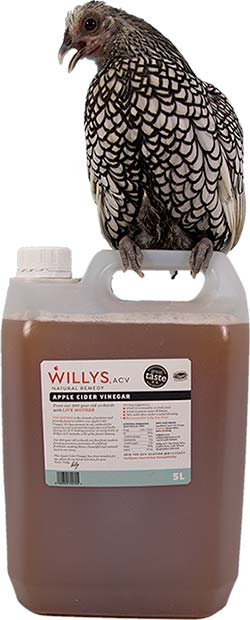
Dilution rate of apple cider vinegar for chickens
Apple cider vinegar for chickens needs to be diluted with water to make a tonic.
The dilution rate is 2% into chicken’s drinking water; in other words, 20ml per litre.
Store your apple cider vinegar out of sunlight to keep the goodness. At this dilution rate, it is a relatively economical product to use, and a 5-litre container should last the average flock several months.
How often should you give apple cider vinegar to chickens?
I usually give apple cider vinegar to my adult chickens, for one week every month (the first week of the month so that I remember which one). I also use it continuously for my chicks and growers from 1-week old through to the point of lay, to help prevent coccidiosis.
Apple cider vinegar is an organic, natural product, so I have found there is no harm in giving apple cider vinegar at this dilution rate to chickens more often. It is advantageous at times of stress, for example, when introducing new chickens to the flock, or during the annual moult.
How much apple cider vinegar do you put in baby chickens water?
I use a dilution rate of 0.5%, or 5ml per litre from 1 to 5 weeks of age whilst chicks are eating chick crumbs, increasing this to 1% from 6 weeks to the point-of-lay at 18-20 weeks whilst they are fed growers pellets.
Tip: Choice of water container
Apple cider vinegar is acidic, so you should only put it into plastic drinkers. Galvanised metal poultry drinkers will react with the acid and corrode. I use these 6-litres and 12-litres, drinkers. They have removable feet, sturdy carrying handles and the bases are interchangeable.
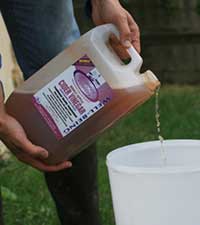
Being a natural supplement, unlike a medication, getting the dose precisely right isn’t that critical, providing you use it in moderation. After getting used to the amount to add to my water containers, I tend to tip in ‘about the right amount’ now instead of measuring it. Still, I would suggest you use the cap or similar to calculate the correct amount for your water containers.
Conclusions
I believe I have seen positive results over the long term by using diluted apple cider vinegar in my chicken’s water.
It is subjective, and there may only be subtle changes in health, that is hard to detect. However, over the last few years, there have been several credible scientific papers that may support using apple cider vinegar for chickens.
There is still a lot of hype surrounding apple cider vinegar and some miraculous claims, some of which should probably be taken “with a pinch of salt”.
Related Chicken Health Articles:
- Garlic for Chickens - I have seen positive results feeding garlic to my chickens.
- Verm-X for Chickens - I have been using Verm-X as part of a holistic approach to keeping my chickens healthy.
- Diatomaceous Earth for Chickens -Another useful, natural product I use as part of my holistic approach to keeping my chickens healthy.
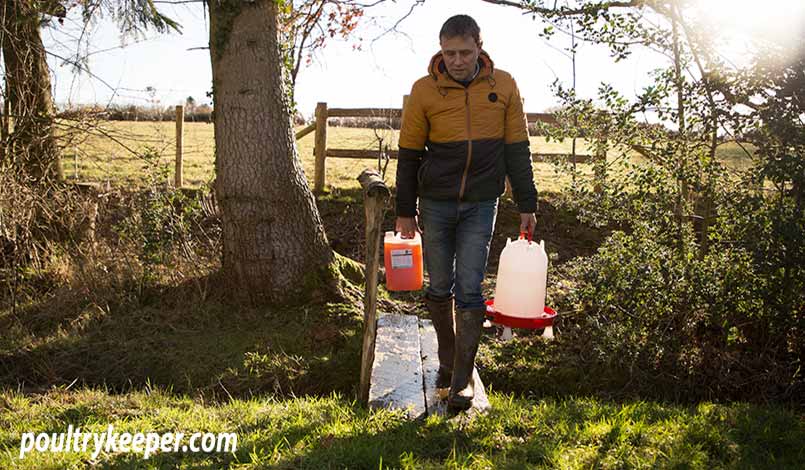
A 5-litre tub of good quality unpasteurised/unrefined apple cider vinegar costs about £15 and should last a small flock several months. I would say it’s certainly worth giving to your chickens as a tonic as part of a natural approach to good health.
Another useful natural supplement that you might be interested in (and I wouldn’t be without) is Diatomaceous Earth.

